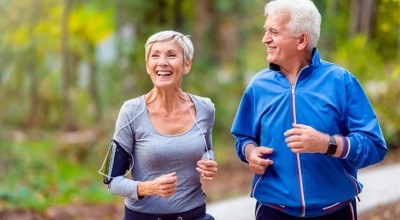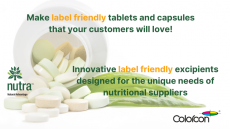Supplementation in the over-50’s: the key to delaying frailty?

The view from many dieticians that the elderly can get all their recommended daily allowance (RDA) of micronutrients, minerals and protein from their food is simply not case, proposed Dr. Max Gowland, founder and managing director of Prime Fifty Ltd.
Speaking at Food Matters Live recently, Gowland described how, when he talked to over 50s, 60s and 70s, people in this age group really just had one objective.
“I just want to keep doing the things I love doing, to keep active, stay independent, stay mobile,” they told him.
Avoidance or delay of frailty was the unifying theme, said Gowland.
“The key was musculoskeletal health. This involves muscle, bone, joints, and fighting fatigue and if you can get all that right you can probably avoid going into frailty too early,” he explained.
Studies on vitamin D deficiency, and its link with frailty, in the elderly are well established. However, deficiencies in the elderly population are prevalent in a much wider range of micronutrients.
Regarding deficiency, “Vitamin D is only the tip of the nutritional iceberg,” said Gowland.
Using data from UK studies, Gowland identified a number of vitamins and minerals critical to ageing where high levels of deficiency were prevalent. These included the vitamins B2, B12C, D, E, folic acid, plus the minerals calcium, magnesium and copper. Deficiency levels in these micronutrients among the over-50s ranged from 30% - 95%.
Apart from low dietary intake, the elderly are also more vulnerable to absorption issues (such as lower vitamin B12 uptake, due to decreased stomach acid production) and the reduced rate of vitamin D synthesis in the skin from sunlight.
“On the one hand you have dieticians saying you don’t need supplements, you can get everything from your food, and then you look at the real fact that, no, we are not getting enough from our food,” Gowland commented.
Protein intake
A major component of frailty in the elderly is sarcopenia – the loss of muscle mass due to ageing. Research has shown that adequate protein intake is critical in maintaining muscle mass. One study which followed the elderly for 3 years, showed 40% lower muscle mass loss in those in the highest quintile of protein intake compared with those in the lowest quintile.
The elderly are also more susceptible than younger adults to rate of muscle mass decline during periods of inactivity and to anabolic resistance – the impaired capacity to synthesise muscle mass.
Gowland highlighted that the outdated World Health Organisation RDA for protein intake of 60 grams/ day (g/d) was now recognised as inadequate with recent science suggesting that 90-110 g/d (or around 1.2 g/ kilogram / day) is more appropriate.
This is equivalent to around four chicken breasts – easy for an athlete to consume, but much more difficult for an elderly person to eat this in a day.
Again, therefore supplementation may be the solution, with Gowland recommending the consumption of whey protein ideally 20g per meal. Whey is widely recognised as high-quality protein and is abundant in leucine – the key branched-chain amino acid (BCAA) responsible for triggering muscle protein synthesis.
Although, sufficient protein intake is crucial, Gowland also stressed the importance of the elderly taking active exercise to minimise loss of skeletal muscle and reduce anabolic resistance.
The Prime Fifty product range developed by Gowland, includes a Maintaining Muscle formula which includes both leucine and whey protein, as well as vitamin D and the minerals potassium, magnesium and calcium. The four-product range also includes other specifically targeted formulae aimed at fighting fatigue, bone health and joint health.
The targeted nutrition approach is key, advocated Gowland, adding that a ‘one-size fits all’ approach simply is not efficacious in the elderly.
"I wanted to launch something that was going to help older people stay active and avoid frailty, as they get older,” he concluded.















